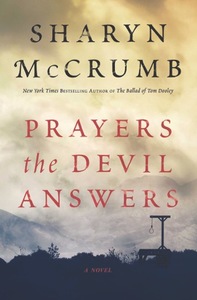

"Prayers the Devil Answers" is both an indictment of those who would hold a woman back simply because of her gender and, at the same time, a celebration of what a person can do when faced with difficult circumstances and seemingly unsurmountable odds.
Sharyn McCrumb's 25th novel, "Prayers the Devil Answers," is based on a true story that traces the events leading up to one woman's unlikely appointment as sheriff in a small Tennessee town in 1936 and the relationship she forges with a convicted murderer in her jail. "Prayers the Devil Answers" follows Ellie Robbins on a journey that she did not ask for and one that she ultimately pays a steep price for.
Those who have read McCrumb's novel "The Songcatcher" may remember the phrase "prayers the devil answers" as the name of a song composed by Lark McCourry. When another character asks her about the song's title, she says, "It came from a saying in our family. When you wish for something and it comes true in a bad way that you weren't expecting, we used to say that it was a prayer the devil answered." Several characters in the novel experience this phenomenon through the lives of her main characters.
The novel follows the storylines of four characters who appear at first to be completely unrelated: Celia and her experience at the Dumb Supper; Sheriff Albert Robbins; Ellie Robbins, his wife, who was appointed sheriff of her small Tennessee town upon the death of her husband; and Lonnie Varden, an artist who comes to town to paint a mural on the wall of the post office. All four of these characters are vividly written and well fleshed out. Even Albert, who is on his deathbed as the novel opens, is as clearly drawn as any character through Ellie's memories and those of others living in the small town.
One of McCrumb's skills as a storyteller is that she is able to portray both the people and the places that she writes about so vividly that the reader can easily imagine going to the town post office or meeting one of the characters on the main street. The railroad that runs through the town, the hoboes who come begging for food, and the townspeople are all presented in a realistic way and without the sentimentality that would only serve to make them mere caricatures. Ellie's family, the deputies she works with, and rest of the town are realistically portrayed; and McCrumb has created in Ellie a strong mountain woman, determined to take care of herself and her two young sons. Her courage is real, as she faces the stereotypical expectations of women during the Great Depression.
The strongest element in this novel, however, is the way that McCrumb illustrates the problem of gender expectations occurring in the troubled early years of the 20th century. In "Prayers the Devil Answers," she addresses the plight of women during the Great Depression as Ellie, like the real-life woman she is based on, is practically held captive by stereotypes, societal expectations and the chauvinistic attitudes of both men and women in Ellie's town and in her family.
McCrumb successfully juxtaposes the superstitious Dumb Supper attended by most of the town girls with the very real responsibilities of a woman who refuses to succumb to the gender expectations of her time and place. Even as she is forced by her strong mountain pride, refusing to be "beholden" to anyone, Ellie takes on those who would have her live with her unpleasant brother-in-law and his wife rather than work to take care of herself and her sons on her own terms.
"Prayers the Devil Answers" is both an indictment of those who would hold a woman back simply because of her gender and, at the same time, a celebration of what a person can do when faced with difficult circumstances and seemingly unsurmountable odds. McCrumb has given us just the woman to overcome those odds in the character of Ellie Robbins.
Holloway is a graduate of Tennessee Technological University and East Tennessee State University. She is the chair of the Technical and Professional Communication department and director of composition at King University. She is completing her dissertation to fulfill the requirements to earn her Ph.D. in composition and TESOL at Indiana University of Pennsylvania.
There's more
>> Sharyn McCrumb will be visiting the region.